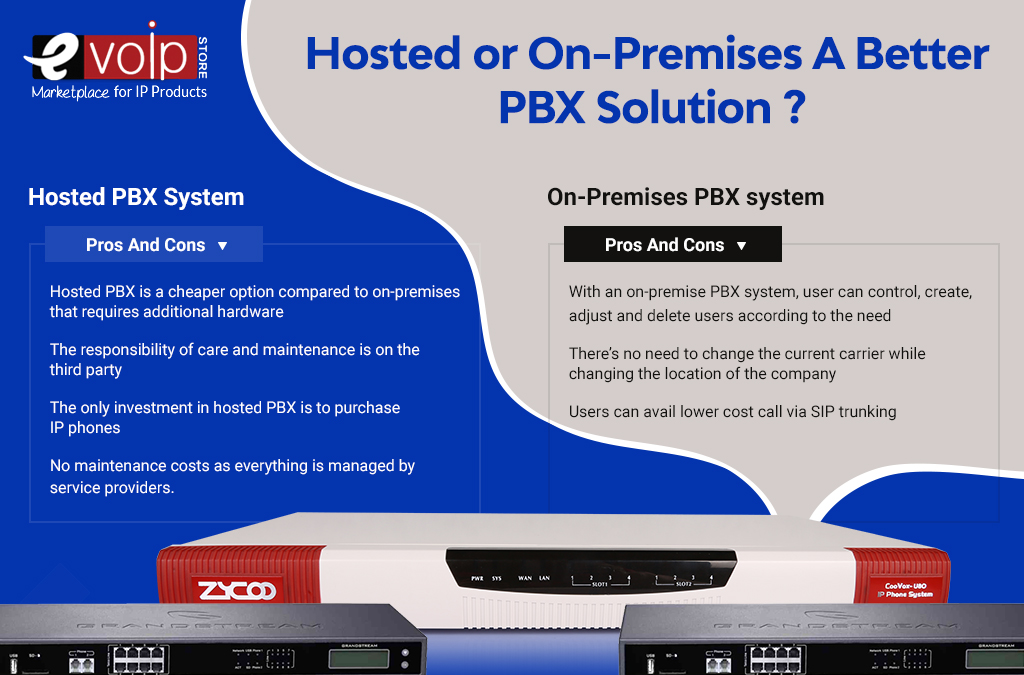Hosted or On-Premises: A Better PBX Solution?

The growing need for an enhanced communication infrastructure and seamless way to transmit information has paved ways for the emergence of new and improvised communication technologies. Irrespective of the size, structure and objectives of a business, every organization needs a backup from a staunch communication infrastructure that not only promotes enhanced communication but also helps in customer relationship management. From conventional phone systems to IP based technologies, there are plenty of communication solutions in the market that serves different communicational requirements. Private Branch Exchange or PBX system is one of the solutions that is widely used by businesses to establish an efficient communication channel within their premises.
PBX System
A private telephone network used within the premises of an organization, a PBX system (Private Branch Exchange) enables businesses to communicate internally and externally via different communication channels including VoIP, and ISDN. Unlike PSTN (Private Switched Telephone Network) where numerous interconnected public network forms a single channel, PBX allows a maximum number of channels within a single intranet network. Furthermore, PBX allows several additional features including free calls, voicemails, call recording, interactive voice menus, and ACD call queues.
Hosted or On-Premises?
There are different forms of the PBX system that serves different communication requirements. While some businesses go for an on-premises hardware that comprises of self-maintenance management provided by service providers/off-site hardware/data centres, some look out for a hosted PBX where communication services are handled by different companies. Both the PBX systems serve a similar purpose of enhanced communication but have different levels of user involvement. Hosted PBX and on-premises hardware have their own set of pros and cons that need to be determined before making any decision. Let's take a look at these two PBX systems and a comparative study of their features:-
Hosted PBX System
Hosted PBX or hosted VoIP is an internet phone system where service provider houses the PBX system and handles the technology on behalf of the company by offering them seamless communication. The desk sets are plugged into a router and all the data, calls, signals, network and features are handled via an IP-PBX server at the service provider’s location. There are different rate packages for accommodating a hosted PBX system. While some may charge monthly fee inclusive of the minute package, other providers only charge according to the per minute usage.
Pros And Cons:
1 - Hosted PBX is a cheaper option compared to on-premises that requires additional hardware.
2 - The responsibility of care and maintenance is on the third party.
3 - The only investment in hosted PBX is to purchase IP phones.
4 - No maintenance costs as everything is managed by service providers.
5 - If service are not well managed, it may affect the call quality and hamper the credibility among customers.
6 - There are many VoIP many companies that ship IP phones with self-installation and maintenance.
On-Premises PBX system
An on-premise PBX system is somewhat similar to a traditional phone system that is installed at a particular location within the company. In the on-premises PBX system, calls can be transferred through a traditional phone or VoIP using SIP trunking. While VoIP is connected via intranet network, traditional phones are connected through gateway cards. The on-premises PBX system hardware is dependent on the number of active users and the number of outside lines. Multiple gateway cards are required depending on the number of users. In case, business grows or expands its employees, a service provider would have to manually upgrade the hardware accordingly.
Pros And Cons:
1 - With an on-premise PBX system, user can control, create, adjust and delete users according to the need.
2 - There’s no need to change the current carrier while changing the location of the company.
3 - Users can avail lower cost call via SIP trunking.
4 - All data and setting are under the user’s control.
5 - On-premises PBX can integrate company software such as CRM systems.
6 - The on-premises PBX system is a relatively expensive option than hosted PBX as it requires additional hardware and regular maintenance.
7 - Users have to follow a regular maintenance practice to ensure its functionality.
PBX has leveraged the potentials of several communication technologies like VoIP technology to offer seamless communication services to the business. Whether it is on-premises hardware or hosted PBX, it depends on the end user to ascertain their requirements and locate an ideal PBX solution that best serves their needs.
